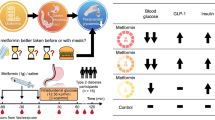Morbid obesity is a serious health problem associated with disease and mortality. One such disease is non-insulin-dependent diabetes mellitus (NIDDM). Approximately 95% of American diabetics have NIDDM. One of the major causes for type 2 diabetes is obesity. The improvement of diabetes with weight control is not in the earliest description of the disease. However, dietary control of NIDDM is often disappointing. Diet can improve glucose metabolism in obesity, but the improvement usually represents only a portion or a brief return to euglycemia, even when patients appear to be compliant. In contrast, reversal of NIDDM has been much more successfully achieved after bariatric surgery. Intra-abdominal fat deposition is associated with increased plasma concentration of free fatty acids, which reduce insulin sensitivity at both muscular and hepatic sites. The progression of diabetes is heralded by the inability of the β-cells to maintain their previously high rate of insulin secretion in response to glucose, in the face of insulin resistance. The propensity to develop type 2 diabetes may be genetically determined or triggered by environmental factors. The connection between diabetes and obesity represents a continuum that progresses through different phases in which defective insulin action is the principal problem. At this point, we are unable to correlate the different findings of the many questions that arise, such as: 1) Does the decrease in sensitivity to insulin result from rearrangement of the insulin receptor? 2) Is weight loss the trigger for decrease of insulin resistance? 3) Is rearrangement of part of the intestine a mechanism to trigger the secretion of hormones (incretins) that help in insulin response? 4) Which mechanism controls the insulin resistance? The goal of this paper is to review literature on incretins and address the role of incretins after bariatric surgery. We know very little about the action of incretins in diabetes. We will assess the interaction between the secretion of incretins and bariatric surgery for the cure of diabetes.
Similar content being viewed by others
Author information
Authors and Affiliations
Rights and permissions
About this article
Cite this article
Frezza, E.E. Are We Closer to Finding the Treatment for Type 2 Diabetes Mellitus in Morbid Obesity? Are the Incretins the Key to Success?. OBES SURG 14, 999–1005 (2004). https://doi.org/10.1381/0960892041719699
Published:
Issue Date:
DOI: https://doi.org/10.1381/0960892041719699




